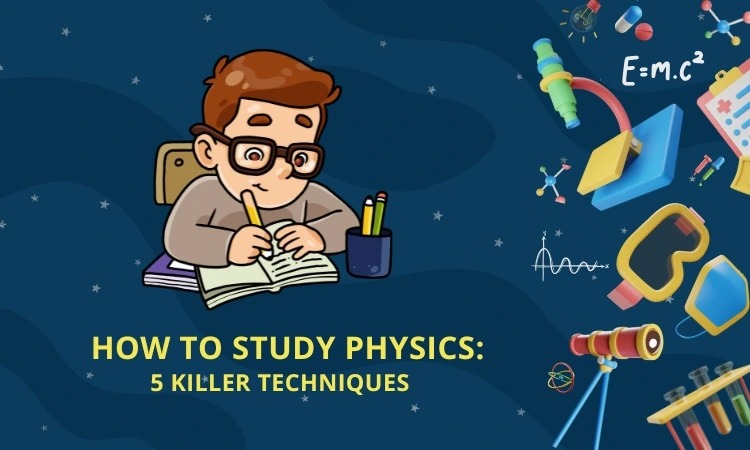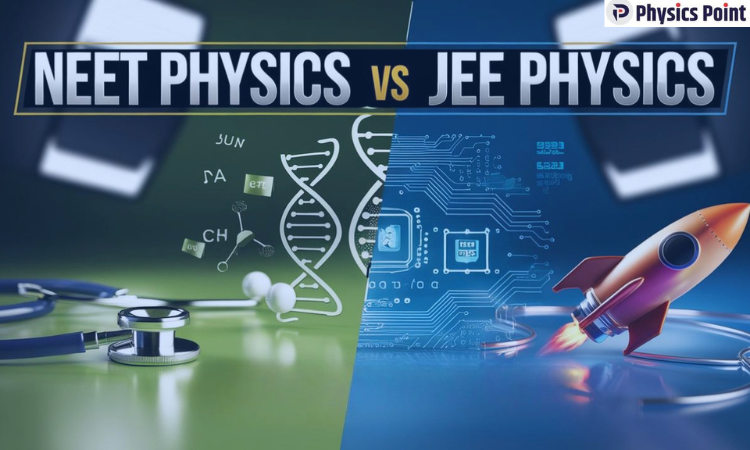
Physics is a subject that often intimidates students, but it doesn’t need to be. Using the right methods, you can not only master physics but also get top grades. If you’re wondering how to study Physics effectively, the secret lies in gaining a fundamental understanding of the concepts, practicing regularly, and using the right tools to reinforce your learning. Nailing down the basics, solving problems daily, incorporating visual aids and graphics, creating an organized study plan, and seeking expert guidance will help you build a strong foundation. These strategies ensure you approach even the most challenging topics with confidence, mastering how to study Physics systematically and efficiently.
The aim is to not just remember something but implement it in an examination and your surroundings. With these 5 tried and tested ways, you will be able to study physics better, think critically, and obtain a further mastery level in the subject. These methods and physics study techniques will position you for whichever test preparation and knowledge-building you wish to do and learn more about how to study physics.
How to Study Physics - 5 Best Physics Study Techniques Tips
| Tip | What to Do | Why It Helps | Examples/Resources |
|---|---|---|---|
| Master the Basics First | Focus on foundational principles like Newton's Laws, energy, motion, kinematics, and dynamics. Use practical examples to connect theory with real-world scenarios. | Provides a solid foundation for understanding advanced concepts. | Examples: Newton's Laws in everyday life, energy transformations in machines. |
| Practice Problems Daily | Solve problems consistently, starting with easy ones and progressing to harder ones. Use multiple sources such as books, past papers, and online resources. | Strengthens concept application, boosts problem-solving skills, and prepares you for real-life physics. | Resources: Past exam papers, online problem-solving platforms like Khan Academy, and physics workbooks. |
| Leverage Visual Tools | Use animations, interactive simulations, mind maps, and flowcharts to visualize abstract concepts. Sketch diagrams for complex problems. | Simplifies understanding, enhances retention, and makes abstract ideas tangible. | Resources: Online simulations for electromagnetism or optics, flowcharts linking mechanics concepts, and wave diagrams. |
| Create a Smart Study Plan | Set clear goals for each study session. Balance time between theory, practice, and revision using spaced repetition techniques. | Ensures systematic learning, reinforces knowledge, and enhances long-term retention. | Strategy: Allocate 30% of time to theory, 50% to problem-solving, and 20% to revision during each session. |
| Seek Expert Support | Enroll in physics tuition or consult an experienced tutor to get personalized guidance and resolve difficult topics efficiently. | Expert help clarifies doubts, boosts confidence, and accelerates progress. | Action: Look for a tutor specializing in your problem areas, such as JK Rai Sir from Physics Point for targeted support. |
1. Master the Basics First
For every physics concept—even the most advanced concepts—there exist fundamental principles that lie underneath. Before dealing with complicated theories, it is very important to be well aware of the fundamentals.
Stick to the basics, such as Newton’s Laws of Motion, where a relation between forces and objects in motion is described. Just as important is the understanding of energy and work, defined as how energy moves and is transformed within systems. In addition, understanding motion and forces in general by seeing how kinematics and dynamics play out through practical examples will give you a strong foundation to work with
2. Practice Problems Every Day
Physics has its emphasis on practice rather than theory. You need to solve problems every day as it strengthens your concept and application of concepts. To take full advantage of practice, begin on easier problems to build confidence. When you are ready, the next step is teasing out a more difficult question for yourself.
Mixing it up with different sources is also crucial in expanding how many problems of different types you see. You can also try to solve problems from different books, past exam papers, and online resources for a broader view. It helps you make the leap from theory to practice and get ready not just for the next test but also for using physics again in real life and this will even clear your confusion of How to Study Physics?
3. Leverage Visual Tools
Physics has many abstract concepts, that are hard to visualize. Visual tools are extremely useful in portraying emotions and values, hope characters, or concepts. Physics animations or interactive simulations available online come to life on electromagnetism, optics, or the motion of an object. These resources illustrate what text cannot describe the actions of forces, energy, and particles. Also, building a mind map or flowchart will relate different concepts. By visually mapping out how topics relate, you can come to have a clearer understanding of the entire subject and understand physics study technique even better. Another excellent resource is diagrams, ideal when it comes to mechanics or waves. It can be helpful to just sketch out the forces acting or paths of motion in complex problems
4. Create a Smart Study Plan
To master physics, you need a proper study layout. Having established objectives for each study session also helps you focus. You can, for example, aim to familiarize yourself with a specific concept or work through a certain amount of problems in one sitting. You should equally pay attention to balancing your time with theory, problem-solving, and revision
Read the book but also take time to work on problems. Revising this is equally another important element of the plan. Physics needs reinforcement since it needs to get accustomed to. Make use of spaced repetition and spread topics out over time, which is extremely effective in improving retention and even you can take help of Best Physics teacher in India Focused study scheduling makes sure that you are not only going through a new copy but also rehearsing the previous content so it remains fresh in your mind.
5. Seek Expert Support
Still confused on how to study physics? Self-study is good, but ultimately without expert assistance, it can be very hard to achieve mastery in physics. A seasoned tutor or mentor can offer tailored advice, answering questions and clarifying confusion in ways that books and unofficial online guidance simply cannot. You can look at working with a physics tutor and sign up for physics tuition to help you address the most challenging learned material, whether that is in understanding a certain theory or applying concepts from it while doing some problem-solving.
Conclusion
Still, Wondering about how to study physics? Physics is one subject you do need to study everything, while also practicing the problems and diagrams as much as possible; coming across studied concepts might make your other subjects more manageable, but physics at its core needs expert aid along with well-planned study sessions.
Physics is not just any other subject; it is a way to understand the universe and its fundamentals or laws, whether it be of atoms or a big star. Mastering these concepts is essential if you aim to score 100 in Physics Class 12 Board exams, as it requires not only understanding but also the ability to apply analytical thinking effectively. Having these skills is invaluable in both the academic and professional world, as analytical thinking is statistically one of the hardest concepts to teach someone and becomes even harder to master oneself. Do connect with the Best Physics Teacher in India if you think you need to understand physics in a very simple and practical way.

